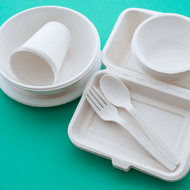New Urgency for Banning 'Forever Chemicals' in Food Packaging
Posted by Emily on 18th Oct 2023 Reading Time:
The BEUC, a notable European consumer group, is pushing hard for a rapid ban on 'forever chemicals' used in food containers. This action comes after alarming findings that these chemicals are widespread in everyday items, particularly food packaging.

What's the big deal with these chemicals? Known technically as per- and polyfluoroalkyl substances (PFAS), they are man-made and do not break down in nature, thus earning the nickname 'forever chemicals'. They're common in products needing water or stain resistance, like pizza boxes, popcorn bags, or takeaway containers. But here's the scary part: studies have connected them to serious health problems, including certain cancers, congenital disabilities, immune system issues, and more.
In a recent report, BEUC highlighted these concerns, pointing out that these harmful substances were found in many consumer products. They emphasised that safer alternatives exist, as these chemicals weren't present in all items tested. Previous tests, including one in 2017, showed worrying levels of these compounds in various food packaging, confirming their widespread use.
The problem is even though these chemicals are everywhere; there aren't enough rules in the EU explicitly targeting paper and board food packaging. The group criticises the lack of effective regulation, even though some forms of PFAS are indeed regulated under EU chemical laws. With over 4,500 similar chemicals, swapping one PFAS for another isn't a solution.

Good news came in 2020 when the European Commission proposed a plan to phase out all non-essential uses of these chemicals. Around the same time, new safety guidelines for PFAS in Food were introduced. More recently, in 2023, a proposal surfaced in the EU to enforce a total PFAS restriction by 2025, recognising the significant risk they pose to both human health and the environment. This proposal is under review, and changes may occur.
BEUC is advocating for swift action on this proposed restriction. They're asking for updates to EU chemical laws to allow for quicker responses to dangerous substances. Their stance is clear: with these chemicals being so durable and potentially harmful, stronger rules are necessary.
Monique Goyens, the head of BEUC, expressed deep concern about the ongoing exposure to these dangerous substances. She emphasised the need for immediate action to ensure consumer safety, which includes a more efficient system for removing harmful chemicals from the market.
In addition to calling for an end to harmful chemicals in consumer items, BEUC wants better enforcement of current laws and stronger controls on imports. This effort is to prevent the sale of dangerous products and those containing substances already outlawed in the EU.
In a related development, scientists from Australia's Minderoo Foundation have introduced the first-of-its-kind database. This resource maps over 3,500 studies on the exposure to chemicals from plastics and the potential health risks. Shockingly, of the 1,500 chemicals catalogued, less than a third have undergone examination for their effects on human health.

Representatives of Minderoo Foundation stressed the need for a careful approach to chemical regulation and continuous health monitoring. They believe it's essential, given the significant gaps in our understanding of these substances and their global use, particularly in environments with extensive exposure to plastic waste.
In summary, the call to action is clear: there is an immediate need to understand better and regulate the myriad chemicals in plastics and everyday products, ensuring they don't pose a continued threat to our health and the world around us.
Sources:
- PFAS in Food: EFSA assesses risks and sets tolerable intake
- Fresh calls for ban on 'forever chemicals' in food packaging
- UBIQUITOUS BUT PREVENTABLE
- Chemicals strategy

